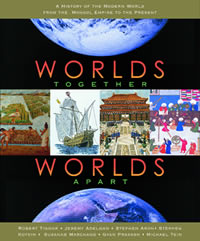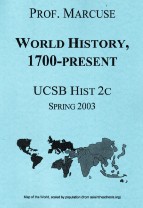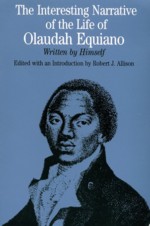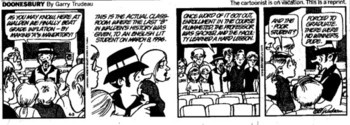- 7/13/04: The on-line journal World History Connected
(homepage)
has some excellent articles for teachers. Next time I teach this course
I'm going to start the course by discussing this June 2004 article about
the fundmental approaches found in world history textbooks: Tom
Laichas, "History and the Textbooks". I think it lays
out very clearly one of my goals for this college-level required introduction
to the discipline of history, namely to help us recognize our underlying
assumptions in the ways we conceive of our world. We are not teaching
The Truth, but how to find principles that can guide our understanding
about how and why things happen, then and now. It would be fun to have
each TA's sections take one of my EIEIO/C causes (see L1
outline) and make arguments for it as the writing assignment.
By the way, I find that William Everdell's article "How
To Use the Theme Of Technology in Teaching the World History Survey
Course" offers some insightful new approaches for examining
some of the tried-and-true events of world history.
- 9/28/04: After seeing the film Outfoxed
(official Outfoxed
site) about how the Fox "News" network systematically
obfuscates opinion and fact, I think historians need to focus more than
ever on teaching students how to assess the reliability and relevance
of their sources. This is a step that would precede the interpretation
of primary source material, which many World History courses
(and the notorious DBQ) emphasize. 11/10/05: here are some
good sites:
- Sept. 29, 2004: I found an interesting and very comprehensive
teaching site developed since 1999 by Alexander Ganse, a German historian
teaching World History at an elite school in South Korea, "World
History at KMLA" (Korean Minjok Leadership Academy) hosted
by the Center for Instructional Media (ZUM) in Germany. It is in English,
and especially the links seem to be excellent and unique (that is, not
the usual top 3 google results).
- Oct. 2, 2004: Well-designed lesson
plan about the genocide in Darfur, Sudan, at newzcrew.org, which
is run by Global Kids and NewsHour Extra. Global Kids is a New York
City-based educational organization that supports urban youth to become
global citizens and community leaders. NewsHour Extra is the student
section of the Online NewsHour, the Web site for PBS's daily news broadcast,
The NewsHour with Jim Lehrer.
- Jan 7, 2005: World History Connected (homepage)
has an excellent newsletter with many interesting articles. See, for
instance, this
2004 special issue on Africa, and the index
of issues.
- March 2, 2005: Adam Hochschild, author of superb
books about slavery in the Belgian Congo and about the antislavery movement,
published an editorial in the LA Times, "A
Monument to Denial," about how this year's anniversary exhibition
at the Brussels Royal Museum of Central Africa whitewashes Belguim's
atrocities in the Congo.
- 2/5/06: I've updated my Imperialism
lecture notes with information about the new documentary based
on Hochschild's book King Leopold's Ghosts.
- April 19, 2005: When I teach this course again in
Spring 2006, students may work in groups to complete the research projects.
Each TA will nominate up to 5 projects for publication on the course
web site. (I and the other TAs will be the judges.) Authors of published
projects may present their work to the class instead of taking the final
exam.
- July 13, 2005: Note to self: possibly use PAIRwise
anti-plagiarism software.
- Sept. 1, 2005: UC Santa Cruz's UC
Atlas of Global Inequality has good resources, including map
projection discussion.
- Sept. 14, 2005: I'm currently reviewing textbooks
to order for my spring 2006 offering. This is a constant source
of agony for me, since I find most narratives severely lacking. (In
plain English, my mind wanders after only a couple of pages.)
- While doing this, I took the multiple
choice quiz
on the site of the Bentley/Ziegler textbook (click m.c. quiz
link on left) that I used last time, for chapter 37, "New Conflagrations:
World War II." Arguably, I should know A LOT about this period,
and I used that textbook before. I scored 71%.
Am I dumb? I hope not. I'd rather claim this as evidence that my
interests in history don't match the textbook's aims, and multiple
choice tests measure how much you think like the test-makers. I
scored 86% on ancient China (which I've never studied), without
reading the text...
- To choose a textbook, one should be clear about one's goals. For
"norms" I looked at:
- For ideas on getting away from a textbook,
Pahl, Ron H., 1943-, Breaking away from the textbook:
creative ways to teach world history (Lanham, Md.:
Scarecrow Education, 2002). UCSB D16.2 .P24 2002 ($17
at amazon)
... is not much help. It's basically a compendium of activities
you can do on topics, like "quick writes," bumper stickers,
posters, poetry, "time traveler,""meet the press,"
etc.
- Idea: Examining various panels from El Fisgon's How to Succeed
at Globalization (2004) would be a fun and profitable exercise
in lecture ($15
at amazon)
- My scratch pad for comparing various college-level World
history texts:
- Adler's World Civilizations
(vol. 2=$77
at amazon). Used in 2004, forget it, way too Eurocentric.
- Bentley/Ziegler, Traditions
& Encounters (v. 2=$75
at amazon) 3rd ed. 2005; vol. c=ch.29-41
- maps definitely weak, illustrations ok;
can't get excited about it
- I used it in 2000; used in my son's AP
World History; my colleague Prof. Spickard uses it.
- Brummett,
Civilization Past & Present ($87
at amazon). Longman, 11th ed. 2005
- The publisher's rep gave me a very persuasive
sell on this one, very revised from the 10th edition, especially
the web ancillaries. I liked it very much, but with the
way I teach I like the shorter Tignor text better--I like
my own (smaller) selection of ancillaries, and feel this
comprehensive website would be too dominant in my course
and necessitate relying on the textbook more than I like
to.
- Bulliet, Crossley, Headrick,
Hirsch, Johnson, Northrup, The Earth and Its Peoples: A
Global History (Houghton-Mifflin 3rd ed. 2005) v. C=ch.
22-34
- more of a core Western narrative, but
interesting graphics & theme boxes; maps fine
- Duiker/Spielvogel's World
History (vol.2=$77
at amazon)
- I used Spielvogel's Western Civ text 1994-98,
and liked it very much. But the World History version doesn't
make enough of a conceptual change to be effective for the
larger framework.
- Fields, Lanny B. , Cheryl A. Riggs,
Russell J. Barber,
Global Past (Bedford)(v.2=$81
at amazon); Reading the Global Past v. 2
- Leaving out a few chaps, possible to do
ch. 31-42/44 in 10 weeks
- more global than Western view, with unique
conceptualizations
- monochrome, but good illustrations, not
the usual, with informative captions & source info
- suggested readings are annotated
- Johnson/Halverson, Sources
of World Civilization (v.2=$50
at amazon)
- Kishlansky's Sources
of World History (vol. 2=$54
at amazon)
- Kishlansky's Society
& Cultures World Hist (v.
- John and William McNeill,
The Human Web: A Bird's-Eye View of World History ($18
at amazon), 370pp.
- Mitchell, Mitchell, Taking Sides: Clashing
Views in World History, v. 2, 2nd ed. (McGraw-Hill)
- Publisher: "presents timely issues
in a debate-style format. The "pro" and "con"
essays foster critical thinking in students while encouraging
them to develop a concern for serious social dialogue"
- Riley, Global Experience:
Readings in World History (Prentice)(v2=$38
at amazon)
- Sanders et al's Encounters
in World History (2005 1st ed)($43
at amazon)
- Sherman, World Civilizations:
Sources, Images and Interpretations (v2=$40
at am.)
- Stearns, Adas, Schwartz, Gilbert,
World Civilizations: The Global Experience (Longman
4th ed. 2004)
- chaps 28-41=industrialization to present;
25=slave trade
- one document per chapter, sources are
attributed
- more color, good contrasting maps, narrative
suggested readings & web sites
- Tignor, Adelman, Aron, Kotkin,...,
Worlds Together, Worlds Apart (Norton 2002)
- Sept. 16, 2005: I definitely need to have a lecture
(or unit) on the relationships between religion and politics in what
we call the "modern age" (does that relationship define
what we mean by "modern"?). Timothy Garton Ash's "What's
your problem with Islam?" (LAT 9/15/05) is remarkably
astute and thought-provoking, also somewhat cryptic.
- Oct. 12, 2005: textbook
 will
be Tignor et al, Worlds Together, Worlds Apart (Norton, 2002) will
be Tignor et al, Worlds Together, Worlds Apart (Norton, 2002)
- Feb. 9, 2006: [note to self] need to start a "World
History Resources page" with a section of important links (like
George Mason U's World History
Matters, and the World History Association's World
History Connected); a section of textbook reviews; a section of
recommended books for the essay assignment, such as:
- Feb. 22, 2006: Crashing/Wait List.
The Spring 2006 course filled up on Feb. 16, and several students have
contacted me about how they can get in. Unfortunately, until the first
class meeting, there is nothing I can do for you--you just have to keep
checking on GOLD and register when you find an open space. On the first
day of class I will freeze enrollment and then TAs can start waiting
lists for any spaces that open up. I WILL ask them to give priority
to certain students. My thinking at this point is:
- First, students (esp. history majors) who have
already taken 2A and 2B
- Second just 2B
- Third just 2A
- Then any other students who can make a reasonable
argument that they are a hardship case. I note that Hist 4B and
4C are also offered this spring, and Hist 2C (I'm pretty sure) will
be offered in summer sessions.
- Feb. 28, 2006: There are 13 sections. Section meeting
times are:
- Tue. 3pm
- Wed. 8, noon, 1, 2, 4, 5, 6
- Fri. 8, 9, 10, 11, noon
- History 500 for the TAs should meet some time
in the slot Tue. 12:30-2:30 [3/23: 12:30-2 in 4041].
- March 5, 2006: Course books. In
case you want to try to get a head start or save some money ordering
the course books on-line or used, these are the three required books:
- Textbook
Tignor et al, Worlds Together, Worlds Apart (Norton, 2002)
($35/78
at amazon)
- Mary Lynn Rampolla, A Pocket Guide to Writing
in History (Bedford, 4th edition 2004)($9/14
at amazon)
- Robert Allison (ed.), The Interesting Narrative
of the Life of Olaudah Equiano: Written by Himself (Bedford,
1995; written 1789)($5/14
at amazon)
- 3/23: UCen bookstore has about five used copies
for $9, lots of new for $14 plus tax
- March 23, 2006: TA Section Assignments
- Rafaela Acevedo-Field: W 4-5, 5-6; F10-11
- Ricardo Caton : W 1-2, 2-3; F 12-1
- Laurence Christian: W 6-7 plus 2CH TBA
- Mary Donaldson: F 8-9, 9-10, 11-noon
- Heidi Marx-Wolf: T 3-4, W 8-9, 12-1
- April 3, 2006: The course is now closed, no need
to try GOLD anymore. Come to class on Tuesday for more info. (And see
Feb. 22 announcement, below)
- April 4, 2006:
- April 5, 2006:
- The honors section meets Wed. 11-1 in HSSB 4041.
Please see Laurence in HSSB 3217 on Thursday between 1-5 p.m. or
on Friday between 9-11:30 a.m. for the first week's meeting. Note
4/12: there is still room, if you are interested.
- See syllabus table for all TA/section
details, and TA office hours.
- April 12, 2006:
- Today (Wed.) at 4pm is the first event I recommend for the second
paper topic:
"Wal-Mart:
The Face of Twenty-First-Century Capitalism,"
presentations with film clips by: Prof. Nelson Lichtenstein (History,
UCSB), and Das Williams (Santa Barbara City Council). Wednesday,
April 12 / 4:00 PM, McCune Conference Room, 6020
HSSB
Prof. Lichtenstein will discuss America’s largest
and most influential company. Santa Barbara City Councilman Das
Williams will join him with a look at Wal-Mart efforts to site stores
on the South Coast. Also screening will be clips from Robert Greenwald’s
Wal-Mart: The High Cost of Low Price.
- I'm working on lecture notes for L1 and L2 now, hopefully ready
later today. (template)
- I'm still getting e-mail from people trying to crash this
course. It's unlikely, but I'll post an enrollment update
Thursday afternoon after I meet with the TAs. See the old announcements
from Feb. 22 and Apr. 4, below.
- April 13, 2006: notes
for L1 (and part of L2) available.
(updated 4/14)
- April 14, 2006: L1
and L2 notes done.
- April 18, 2006: L3+4
notes in progress; Events & Books for
2nd paper started.
- April 20, 2006: The two EVN videos on the Industrial
Revolution shown in L3 are now available to watch in the Kerr Hall language
lab (2nd floor). The Equiano video is from the UCSB library's media
collection (1st floor, behind gov't documents): HT 869.E6 S66 1996
- April 28, 2006: Events page
updated (see also ideas for papers based on photo
exhibition).
I'm working on more lecture notes now.
- April 29, 2006: Notes for French
Revolution lectures L7+L8 are essentially done.
- If you missed L8, you missed (I think) something important that
will shape later lectures, and you may be confused about what's
going on. In any case, be sure to do the following before
L9 on Tuesday, May 2:
Read (at least!) textbook pp. 210-213, and reader #3-9 (pp. 27-48),
esp. Bolivar, pp. 42-44.
The lecture is titled "Leaders and Popular Mobilization in
Latin America."
- I will try to get more notes and study tips for the midterm done
Sunday night and Monday morning. For the format of the
midterm see the 2003 midterm
study guide.
- May 1, 2006: Notes for L5:
Slavery & Antislavery almost complete; Events
page updated.
Ok, so many students are asking, I've started a Midterm
Study Guide. But it will be preliiminary until Wednesday.
- May 2, 2006: model
source analysis of Sun Yat-Sen text available.
- May 3, 2006, 2:45pm: midterm
study guide now updated. I will add some comments to the model source
analysis (in May 2 announcement) by 11pm tonight. [11pm: updated
source handout; be sure to click 'refresh' on your browser
to get the updated version!]
Note 10:20pm: several students have contacted me that
the study guide was not updated. It was and is. Be sure to click "refresh"
or "reload" on your browser's menu bar to get the current
version. I just changed the instruction for the essay question to make
clear that you will get only one of the questions--no choice--on the
actual exam.
- May 5, 2006: now that the midterm is passed, you
need to start thinking about the second paper (see
assignment at top of the Events page [updated
5/10]). If you have questions about topics or the assignment, e-mail
me in advance or ask them in lecture May 9, and I will answer them then.
- May 12, 2006: Yesterday evening I sent out an announcement
that the 2006 midterm
survey (18 brief questions) is now ready. Please take it as
soon as possible.
View submitted surveys (one by one--not very enlightening; 75 by
8am Friday, 100 by 10am Sat.); chnm
login.
- May 14, 2006: Notes
for L11+12 on China and Japan are available.
As of 8pm Sunday only 116 students have completed the midterm
survey. Please do so asap!
129 by 5pm Monday.
By the way, the textbook
website has review materials: summaries, quizzes, chronologies.
- May 18, 2006: Adding some links that will be relevant
soon:
- May 19, 2006: Events page
updated with Second Paper Advice and FAQ.
- May 20, 2006: 2003 Sample Papers page added, with 3 first draft papers from 2003.
- Best paper prize competition! Inspired by the History Department's prizes ceremony last week, and by the 2003 sample papers, I am going to sponsor a prize competition for the best 3-5 papers submitted for the second paper assignment.
- Procedure: Each TA will nominate 2-4 papers (roughly 1 per section) that I will review and select up to five. Some TAs will rank those five to determine the final winners.
- Prizes: total of $50 in gift certificates to amazon.com or the UCen bookstore, winners' choice (so $20, 15, 15; or $15, 15, 10, 10; or all $10, depending on how many winners).
- If the winners are willing, I would like to publish the papers (final versions) on the course website.
- June 11, 2006: Mon & Tue office hours: noon-2pm on 6/12 and 6/13 only.
- I've had several requests to post more lecture notes. I'll only have time for one or at most 2. I'm going to start with L17 (EIEIO of genocide, World Systems Theory, 3x authoritarian rule). Unless I receive requests for others, I'll do L19: Cold War after that.
[note 12/20: never had time] I'll shoot for Monday around noon for the next update.
- June 12, 2006 (Monday): L17 pretty much complete. 5pm: Study Guide updated.
|



 Course
materials (
Course
materials ( Excellent
site with an
Excellent
site with an 